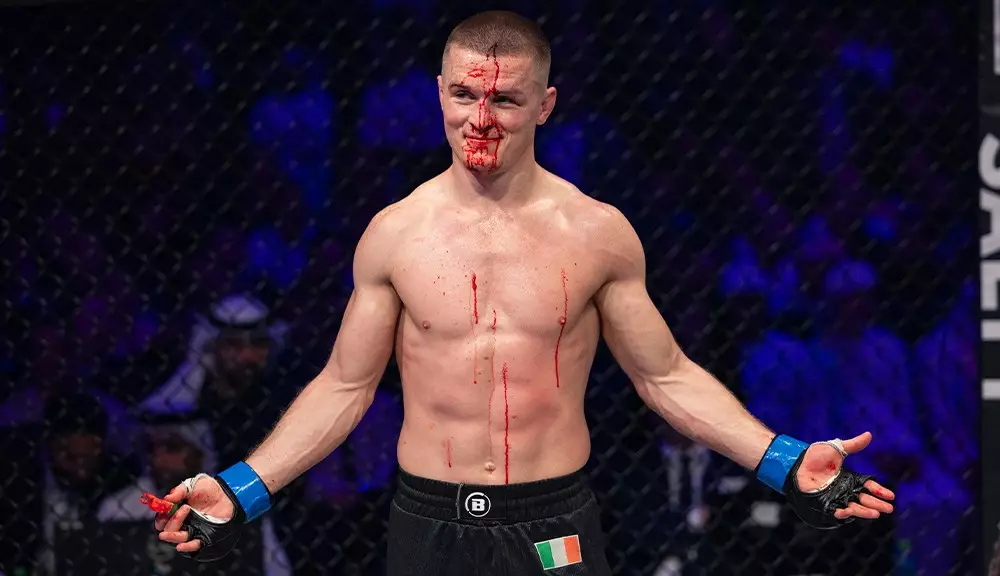In the world of professional fighting, the narrative of struggle, perseverance, and sometimes, heartbreak is a frequent theme. This rang true for Paul Hughes during his recent showdown against the undefeated Bellator lightweight champion Usman Nurmagomedov at the PFL Champions Series: Road to Dubai. Hughes entered the octagon hailed as a significant underdog, but emerged with his head held high, despite suffering a majority decision loss. His performance was a testament to his resolve and skill, but the controversy surrounding the judges’ decision adds another layer to this gripping encounter.
Throughout the five-round bout, it was evident that Hughes was not merely an afterthought in the match. He challenged Nurmagomedov, pushing him to the brink and demonstrating late-game resilience that kept fans on the edge of their seats. With moments of sustained momentum, Hughes believed that he had done enough to earn the victory. He celebrated at the final bell, yet his jubilation was thwarted when the scorecards revealed outcomes that did not align with his performance. Two judges scored the fight 48-46 in favor of Nurmagomedov, while one judge ruled it a 47-47 draw.
Hughes, understandably upset, regarded the judging as unfair, noting the palpable energy in the arena that suggested he had done enough to secure the win. His frustration was palpable in his post-fight comments on Instagram, where he expressed disappointment without making excuses. This kind of mindset speaks volumes about Hughes’ character and determination, traits often crucial for professional athletes who strive for greater heights.
One of the most significant, yet unfortunate, moments of the fight was an accidental clash of heads in Round 4. Hughes pointed out that this incident halted his momentum just when he felt he had the upper hand. Up until that point, he believed he was effectively capitalizing on his striking ability, particularly his punishing body shots, which seemed to be breaking down Nurmagomedov’s defenses. The delay allowed Nurmagomedov the chance to recover, a pivotal moment that Hughes felt shifted the dynamics of the match in his opponent’s favor.
This clash of heads not only inflicted a cut on Hughes but also disrupted the rhythm he had worked so hard to establish. It is crucial in combat sports how such moments can alter the course of a fight, and for Hughes, the timing of that collision was particularly painful. He acknowledged the legality of Nurmagomedov’s recovery, yet it certainly left a bitter taste regarding what could have been had the incident not occurred.
Despite the heartache and disappointment that accompany a close loss, Paul Hughes appears to be unyielding in his quest for excellence. His determination to pursue a rematch with Nurmagomedov signifies a fighter who does not allow setbacks to define him. Instead, these experiences serve as a learning curve, propelling him toward even greater preparation and strategy in anticipation of future challenges.
In his reflections, Hughes shared an unwavering commitment to leave no doubt the next time he faces Nurmagomedov. This mindset showcases not only his tenacity but also an understanding that great athletes must rise from challenging circumstances with an even greater resolve. It’s a testament to his character, as he hopes to eventually reclaim victory not just for himself but also for the supporters who witnessed his intense effort in the octagon.
In the hyper-competitive sphere of mixed martial arts, the balance between victory and failure can often hinge on the smallest details. Paul Hughes’ recent encounter with Usman Nurmagomedov is an embodiment of this reality. While he left Dubai without the championship title, the fight has undoubtedly ignited an even stronger fire within him. He remains focused and poised, ready to channel the disappointment into future endeavors. For Hughes, the road doesn’t end here—it merely unfolds into a new path, filled with determination, lessons learned, and a robust desire for redemption.

